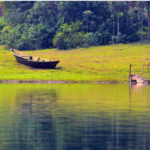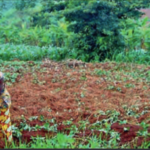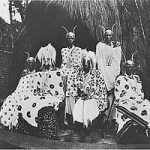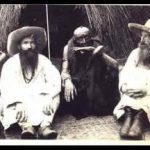VIII. Some Aspects Of The Kinship Structure
The Banyaremera belong to a Hill, to a subdivision thereof called an umerenge, and to a neighborhood, for which there is no term in Kinyarwanda. They also belong to patri-clans (sing. ubwoko, pl. amoko), and to unsegmented shallow lineages (.-ryango),in the case of the Hutu, and to more extensive lineages, also unsegmented, in the case of Tutsi.
The smallest socio-political unit among the population at large within the community is the three-generation lineage. This is the unit to which the Munyaremera refers when he speaks of his umuryango.
The oldest generation in the shallow lineage becomes less and less active as the next generation has children and becomes more and more active, so that, in effect, the efficiency of the lineage always remains three generations deep. In the cases where the head of the lineage is deceased and only two generations remain, the deceased man continues to be considered as official head of the group until a third generation is born. The death of such a man, however, does not prevent the lineage from having an effective head among the living.
All males of a generation are as “brothers” to each other and all females are as “sisters”. All males in the ascending generation are as “fathers” and all females as “mothers”. All children of a descending generation are as “sons” and “daughters.”
These three generations are each seen as a unit by the Banyaremera themselves. Within the lineage, Ego’s generation is called, collectively, his abavandimwe; his parents’ generation are his ababyeyi; and his children’s generation, abana. These terms, with the exception of abana, are distinct from the terms for the relationships to individuals in the various generations. They refer to each generation as a group and illustrate the fact that threegenerations constitute the shallow lineage and the only one that is consistently functional among the Hutu peasants. The term “shallow” is used in preference to “minimal” because the latter implies a segmentation which does not exist in Remera.
The relationship among abavandimwe is a crucial one. Those who stand as brothers to each other owe each other help in every way possible, and it is understood that ideally they must work as a unit.
Abavandimwe had — at least in olden days, and possibly even now — right of access to each other’s wives. When one of the abavandimwe dies, one of the others may “inherit” his wife, either as a wife or as a dependent. She, however, can refuse this arrangement and is then free to re-marry outside of the lineage. If this woman has produced children, there is no return of the bride-price.
A father’s wife could also be “inherited” by one of the sons in the lineage who is not her own offspring. She also becomes either a wife or a dependent as in the case above. But always the care of these women is administered by the lineage council, as is the care of the children of the lineage.
The council of the shallow lineage is composed of the middle generation, the abavandimwe, along with their male ababyeyi. Problems of discipline are handled here; problems of land and the general policy of the lineage towards external authority and obligations are also regulated by this council. This latter function is probably a crucial one. Having to offer a counterbalance against external authority is one force that holds the lineage together. This is a principle of cohesion in Remera much stronger than religion, for which the Banyaremera manifest a quasi-absolute indifference.
The council is ruled by the head of the lineage who is responsible for the conduct of the lineage as a whole and it is through him that the external authority reaches the lineage. The members of the lineage are expected to follow his lead. However, if any one of them does not agree with him, he and his individual family may withdraw from participation in the lineage and join another “lineage”, i.e., that of a patron to whom he becomes client.
There is rarely a specific name for each lineage, the exception being those lineages which have had a lineage head of exceptional influence. The lineage takes on his name. Such is the case, for instance, of the Abavuna in Remera whose founder was a man by the name of Ruvuna.
At the time of investigation, although these lineage councils still existed, they were prohibited from meeting by the political party in power. Following the elections of July 1960, fear of “subversive” political meetings — i.e. those of other parties — led to the prohibition of any kind of reunion other than those organized by the burgomaster.
https://uk.amateka.net/viii-some-aspects-of-the-kinship-structure/https://uk.amateka.net/wp-content/uploads/2021/04/workshop.jpghttps://uk.amateka.net/wp-content/uploads/2021/04/workshop-150x150.jpgModel CitizenshipThe Banyaremera belong to a Hill, to a subdivision thereof called an umerenge, and to a neighborhood, for which there is no term in Kinyarwanda. They also belong to patri-clans (sing. ubwoko, pl. amoko), and to unsegmented shallow lineages (.-ryango),in the case of the Hutu, and to more extensive...BarataBarata rpierre@ikaze.netAdministratorAMATEKA | HISTORY OF RWANDA




